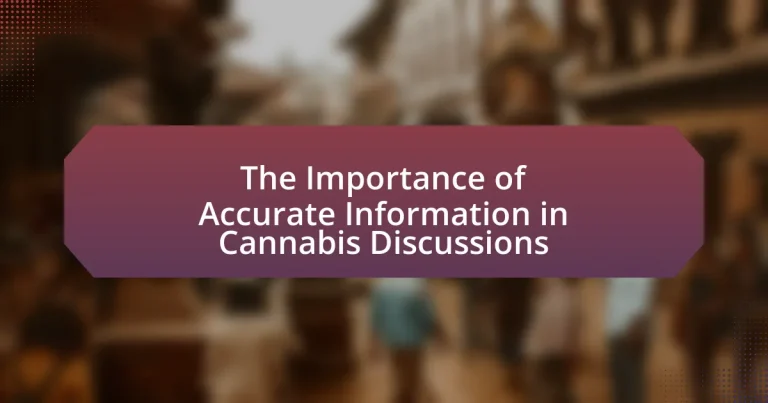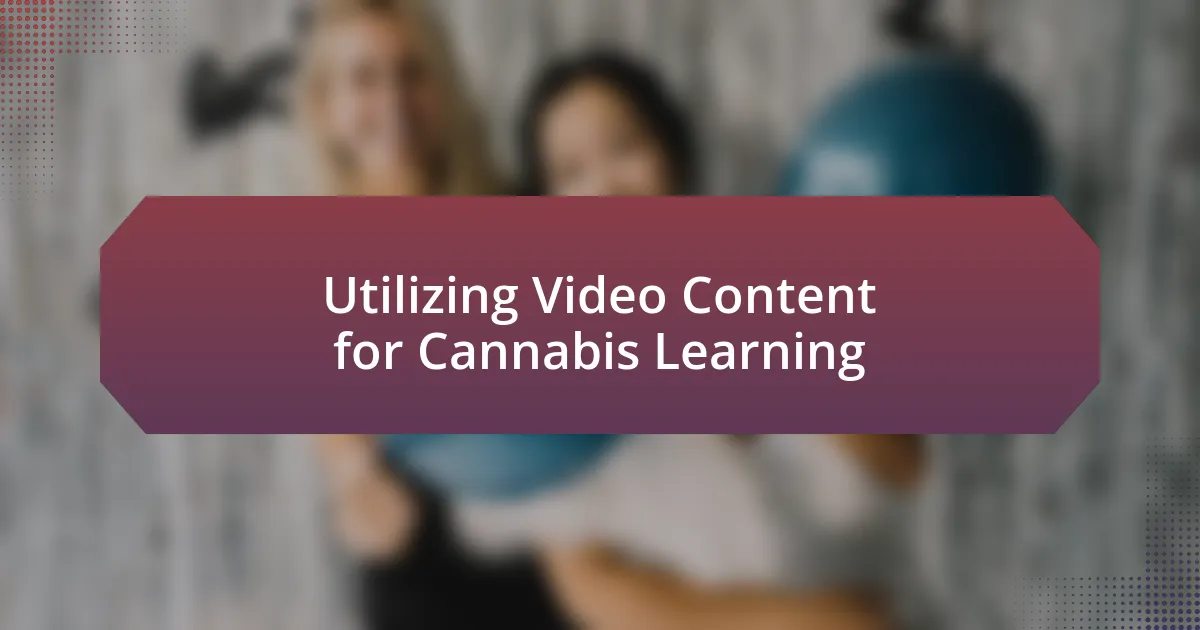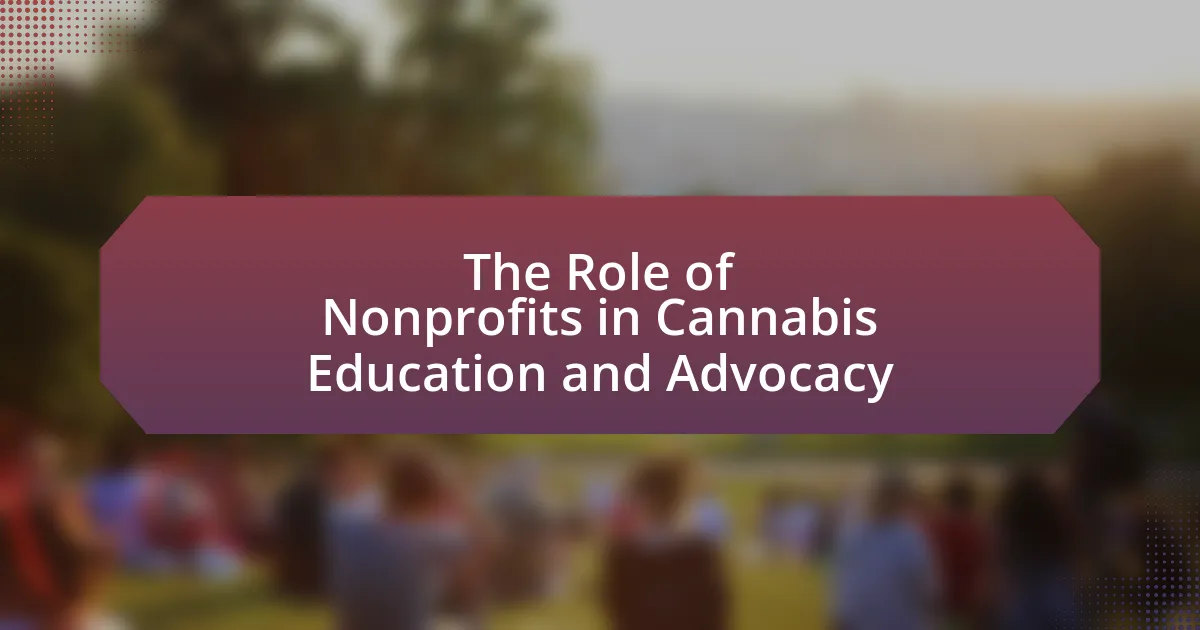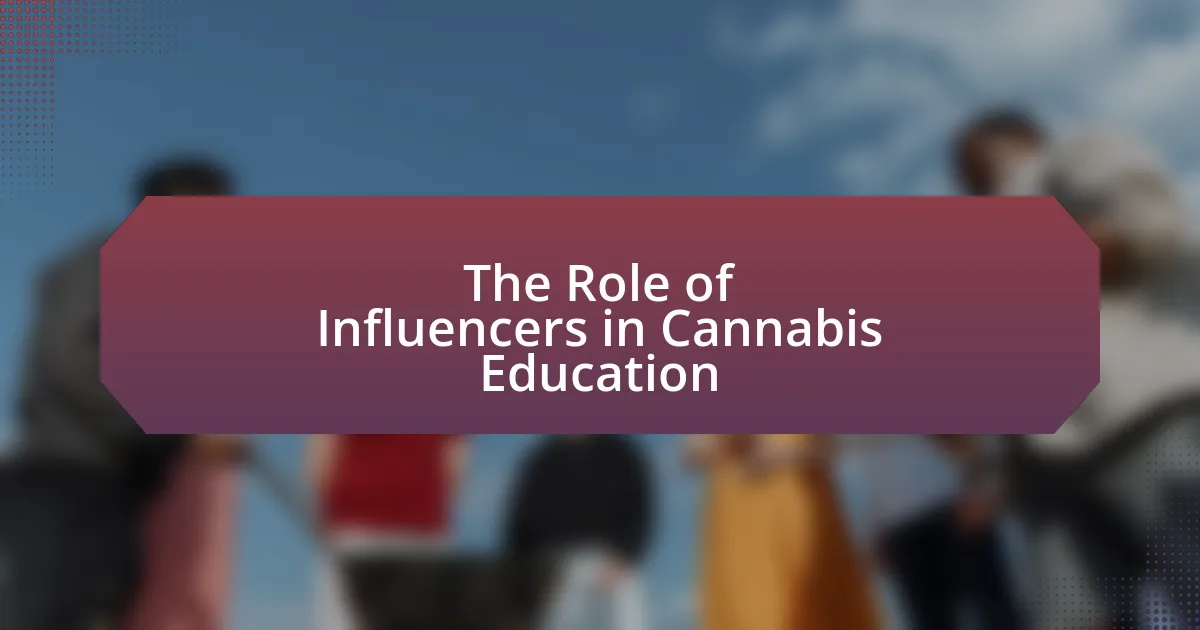Accurate information is essential in cannabis discussions as it influences public perception, policy decisions, and health outcomes. Misinformation can lead to stigma, hinder legalization efforts, and result in unsafe consumption practices, impacting individuals’ willingness to use cannabis for medicinal purposes. The article explores the consequences of misinformation, the role of credible sources, and the importance of accurate data in personal health choices and business decisions related to cannabis. It also highlights strategies to promote accurate information and combat misinformation, emphasizing the need for evidence-based education and critical thinking in discussions surrounding cannabis.
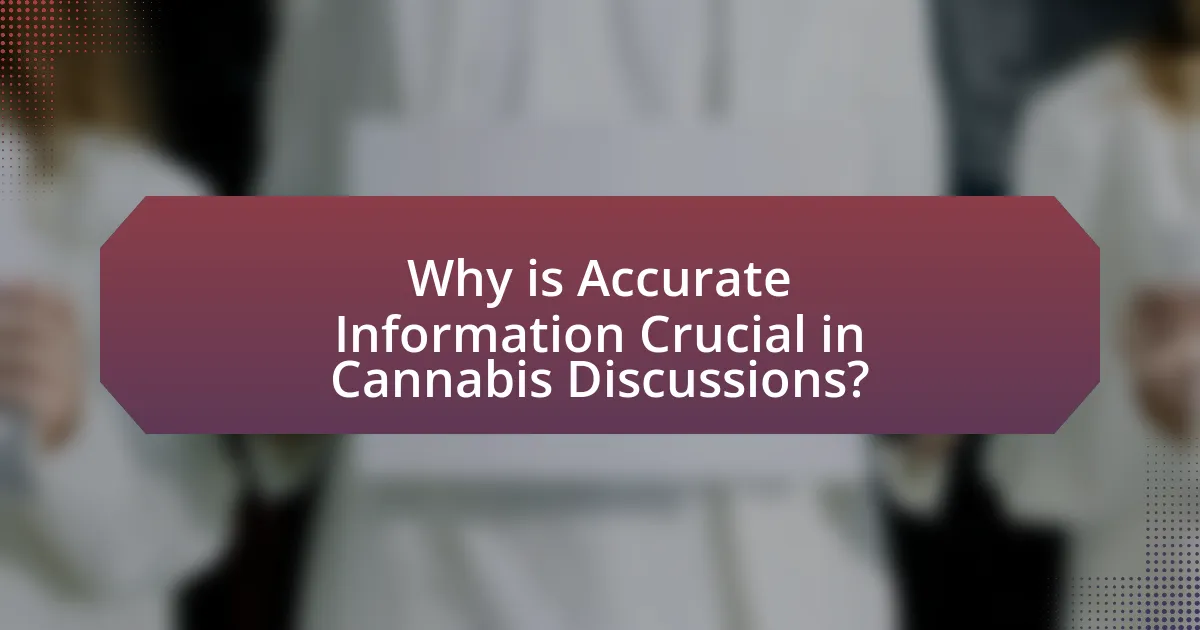
Why is Accurate Information Crucial in Cannabis Discussions?
Accurate information is crucial in cannabis discussions because it shapes public perception, informs policy decisions, and influences health outcomes. Misinformation can lead to stigma, hinder legalization efforts, and result in unsafe consumption practices. For instance, a study published in the journal “Drug and Alcohol Dependence” found that misconceptions about cannabis can negatively affect individuals’ willingness to use it for medicinal purposes, despite its proven benefits for conditions like chronic pain and epilepsy. Therefore, ensuring that discussions are grounded in factual data is essential for fostering informed decision-making and promoting responsible use.
What are the potential consequences of misinformation in cannabis discourse?
Misinformation in cannabis discourse can lead to significant public health risks and hinder effective policy-making. For instance, inaccurate claims about the safety and efficacy of cannabis can result in individuals making uninformed health decisions, potentially exacerbating issues related to substance use disorders. A study published in the journal “Drug and Alcohol Dependence” found that misconceptions about cannabis can influence users’ perceptions of its risks, leading to increased consumption among vulnerable populations. Furthermore, misinformation can obstruct legislative efforts aimed at regulating cannabis, as policymakers may rely on flawed data to shape laws, ultimately affecting access and quality of cannabis products.
How can misinformation affect public perception of cannabis?
Misinformation can significantly distort public perception of cannabis by perpetuating myths and misconceptions about its effects and legality. For instance, exaggerated claims about cannabis leading to severe health issues or criminal behavior can create fear and stigma, influencing public opinion against its use. Research from the National Institute on Drug Abuse indicates that misinformation can lead to increased negative attitudes toward cannabis, despite evidence showing its medicinal benefits. This disconnect between public perception and scientific understanding can hinder policy reform and limit access to cannabis for therapeutic purposes.
What impact does inaccurate information have on policy-making related to cannabis?
Inaccurate information significantly undermines policy-making related to cannabis by leading to misguided regulations and public health initiatives. For instance, exaggerated claims about the dangers of cannabis can result in overly restrictive laws that do not reflect the actual risks associated with its use, as evidenced by studies showing that cannabis is less harmful than substances like alcohol and tobacco. Furthermore, misinformation can perpetuate stigma, influencing lawmakers to prioritize punitive measures over evidence-based approaches, which can hinder effective public health strategies and limit access to medical cannabis for patients who could benefit from it. Accurate data is essential for informed decision-making, as demonstrated by the shift in policy in states that have legalized cannabis after reviewing comprehensive research on its effects.
How does accurate information contribute to informed decision-making?
Accurate information enhances informed decision-making by providing reliable data that individuals can trust when evaluating options. In the context of cannabis discussions, accurate information about effects, legal status, and health implications allows consumers, policymakers, and healthcare professionals to make choices based on facts rather than misconceptions. For instance, a study published in the Journal of Cannabis Research found that access to accurate information significantly improved public understanding of cannabis benefits and risks, leading to more responsible usage and policy formulation. This demonstrates that accurate information is essential for making well-informed decisions that can positively impact health and societal outcomes.
What role does accurate information play in personal health choices regarding cannabis?
Accurate information is crucial in personal health choices regarding cannabis as it directly influences decision-making and health outcomes. Individuals rely on factual data about cannabis’s effects, benefits, and risks to make informed choices about its use for medical or recreational purposes. For instance, studies have shown that misinformation can lead to misuse or avoidance of cannabis, impacting conditions like chronic pain or anxiety where cannabis may provide relief. The National Academies of Sciences, Engineering, and Medicine reported in 2017 that there is substantial evidence that cannabis is effective for chronic pain management, highlighting the importance of accurate information in guiding individuals toward beneficial health choices.
How can accurate data influence cannabis-related business decisions?
Accurate data significantly influences cannabis-related business decisions by providing insights into market trends, consumer preferences, and regulatory compliance. For instance, data analytics can reveal which cannabis products are most popular among consumers, allowing businesses to tailor their offerings accordingly. Additionally, accurate sales data can help companies forecast demand, optimize inventory levels, and reduce waste, ultimately improving profitability. A study by BDS Analytics found that businesses leveraging accurate market data experienced a 20% increase in sales compared to those that did not utilize such insights. This demonstrates that informed decision-making, driven by precise data, is crucial for success in the competitive cannabis industry.
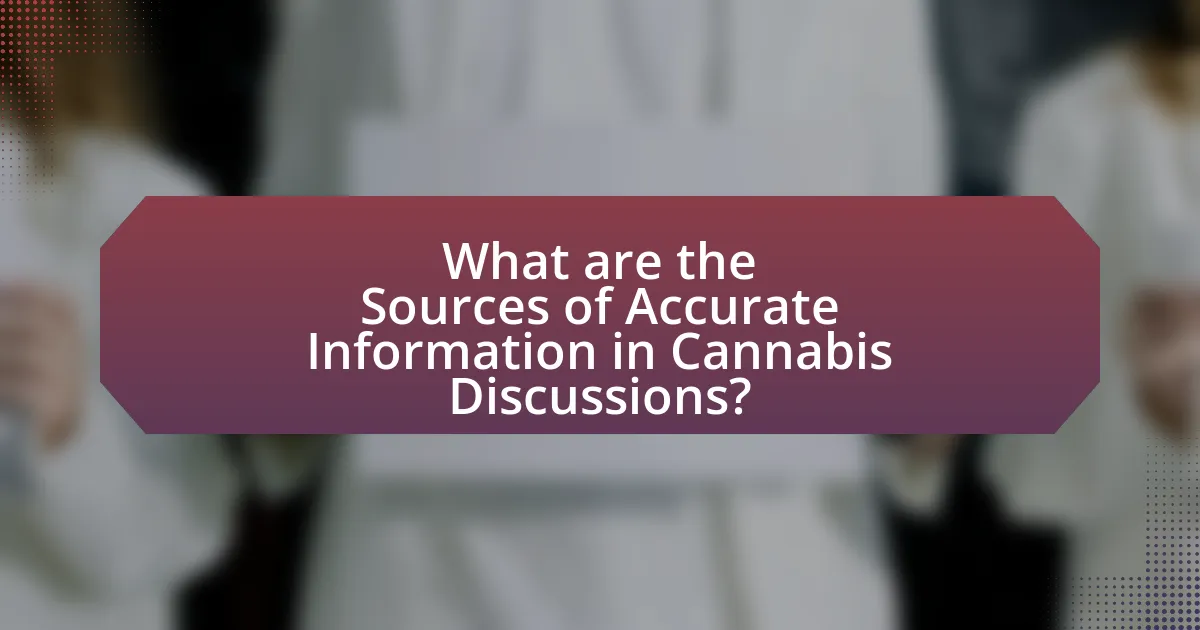
What are the Sources of Accurate Information in Cannabis Discussions?
Accurate information in cannabis discussions primarily comes from peer-reviewed scientific journals, government health agencies, and reputable non-profit organizations. Peer-reviewed journals, such as the Journal of Cannabis Research, provide validated studies that explore the effects, benefits, and risks associated with cannabis use. Government health agencies, including the National Institute on Drug Abuse (NIDA) and the Centers for Disease Control and Prevention (CDC), offer evidence-based guidelines and research findings that inform public understanding. Additionally, organizations like the American Medical Association (AMA) and the American Cannabis Nurses Association (ACNA) publish resources that synthesize current research and clinical practices related to cannabis. These sources are essential for ensuring that discussions about cannabis are grounded in reliable and scientifically supported information.
How can individuals identify credible sources of cannabis information?
Individuals can identify credible sources of cannabis information by evaluating the qualifications of the authors, the presence of peer-reviewed research, and the reputation of the publishing organization. Credible sources typically feature authors with relevant expertise, such as degrees in medicine, pharmacology, or botany, which ensures that the information is grounded in scientific knowledge. Additionally, information supported by peer-reviewed studies, published in reputable journals like the Journal of Cannabis Research, enhances credibility, as these studies undergo rigorous evaluation by experts in the field. Furthermore, organizations such as the American Medical Association and the National Institutes of Health are recognized for their authoritative stance on health-related topics, making their publications reliable sources for cannabis information.
What characteristics define a reliable source in cannabis research?
A reliable source in cannabis research is characterized by peer-reviewed publications, transparency in methodology, and the credentials of the authors. Peer-reviewed publications ensure that the research has undergone scrutiny by experts in the field, which enhances its credibility. Transparency in methodology allows for reproducibility and verification of results, which is essential for scientific integrity. Additionally, authors with relevant qualifications and experience in cannabis research contribute to the reliability of the source, as their expertise supports the validity of the findings. For instance, studies published in journals like the Journal of Cannabis Research adhere to these standards, reinforcing the importance of accurate information in cannabis discussions.
How do peer-reviewed studies contribute to the credibility of cannabis information?
Peer-reviewed studies enhance the credibility of cannabis information by ensuring that research undergoes rigorous evaluation by experts in the field before publication. This process helps to validate the methodology, findings, and conclusions drawn in the studies, thereby providing a reliable foundation for claims about cannabis. For instance, a study published in the Journal of the American Medical Association (JAMA) demonstrated that peer-reviewed research on cannabis can lead to evidence-based guidelines for medical use, which are critical for healthcare professionals and policymakers. Such studies are essential in distinguishing scientifically supported information from anecdotal claims, ultimately fostering informed discussions about cannabis.
What role do government and health organizations play in providing accurate cannabis information?
Government and health organizations play a crucial role in providing accurate cannabis information by establishing guidelines, conducting research, and disseminating evidence-based data to the public. These entities, such as the National Institute on Drug Abuse and the Centers for Disease Control and Prevention, ensure that the information shared is scientifically validated and reflects current understanding of cannabis effects, usage, and regulations. For instance, the National Academies of Sciences, Engineering, and Medicine published a comprehensive report in 2017 that reviewed over 10,000 studies, concluding that cannabis can be effective for certain medical conditions, which informs both policy and public perception. By providing reliable information, these organizations help to combat misinformation and promote informed decision-making regarding cannabis use.
How do official guidelines from health organizations shape public understanding of cannabis?
Official guidelines from health organizations significantly shape public understanding of cannabis by providing evidence-based information that influences perceptions and behaviors. These guidelines, such as those from the World Health Organization and the Centers for Disease Control and Prevention, clarify the medical uses, potential risks, and legal status of cannabis, thereby informing public opinion and policy. For instance, the World Health Organization’s 2018 report on cannabis highlights its therapeutic potential while also addressing concerns about misuse and health risks, which helps to balance public perception. By disseminating clear, research-backed information, these organizations play a crucial role in educating the public, reducing stigma, and guiding informed decision-making regarding cannabis use.
What initiatives are in place to promote accurate cannabis education?
Various initiatives are in place to promote accurate cannabis education, including state-sponsored educational programs, nonprofit organizations, and academic research collaborations. For instance, many states have established public health campaigns aimed at informing citizens about the effects and legalities of cannabis use, often funded by tax revenue from cannabis sales. Nonprofit organizations, such as the National Organization for the Reform of Marijuana Laws (NORML), provide resources and advocacy for accurate cannabis information. Additionally, universities are increasingly conducting research on cannabis, contributing to a growing body of evidence-based knowledge that informs public understanding and policy. These initiatives collectively aim to dispel myths and provide factual information regarding cannabis.

How Can We Promote Accurate Information in Cannabis Discussions?
Promoting accurate information in cannabis discussions can be achieved through the implementation of evidence-based education and the use of credible sources. Educational initiatives that focus on scientific research, such as studies published in peer-reviewed journals, can provide a solid foundation for understanding cannabis effects and benefits. For instance, the National Academies of Sciences, Engineering, and Medicine published a comprehensive report in 2017 that reviewed over 10,000 studies, concluding that cannabis can be effective for chronic pain management and other medical conditions. Additionally, encouraging open dialogue among experts, healthcare professionals, and the public can help dispel myths and misinformation. Utilizing platforms that prioritize fact-checking and expert contributions, such as reputable health organizations and academic institutions, further enhances the reliability of information shared in cannabis discussions.
What strategies can be employed to combat misinformation in cannabis discussions?
To combat misinformation in cannabis discussions, employing fact-checking, promoting credible sources, and fostering open dialogue are essential strategies. Fact-checking involves verifying claims made about cannabis through reliable databases and scientific studies, which helps to clarify misconceptions. Promoting credible sources, such as peer-reviewed journals and reputable organizations like the National Institute on Drug Abuse, ensures that discussions are grounded in scientifically validated information. Fostering open dialogue encourages individuals to share experiences and knowledge, allowing for a more nuanced understanding of cannabis and its effects. These strategies collectively enhance the quality of information shared and reduce the prevalence of misinformation.
How can social media platforms improve the accuracy of cannabis-related content?
Social media platforms can improve the accuracy of cannabis-related content by implementing stricter content moderation policies and utilizing fact-checking algorithms. These platforms can employ machine learning tools to identify and flag misinformation, ensuring that users are presented with verified information. For instance, platforms like Facebook have already begun using third-party fact-checkers to assess the validity of health-related claims, which can be extended to cannabis content. Additionally, providing users with access to credible sources, such as government health agencies or peer-reviewed studies, can enhance the reliability of the information shared. Research indicates that misinformation can significantly influence public perception and behavior regarding cannabis, highlighting the need for accurate content dissemination.
What role do educational programs play in enhancing public knowledge about cannabis?
Educational programs play a crucial role in enhancing public knowledge about cannabis by providing accurate, evidence-based information that dispels myths and misconceptions. These programs educate individuals on the effects, benefits, and risks associated with cannabis use, thereby fostering informed decision-making. For instance, studies have shown that comprehensive cannabis education can lead to a better understanding of its medicinal properties and potential side effects, which is essential for public health. Furthermore, educational initiatives often include data from reputable sources, such as the National Institute on Drug Abuse, which highlights the importance of informed discussions surrounding cannabis legislation and usage.
What best practices should individuals follow when discussing cannabis information?
Individuals should prioritize accuracy and credibility when discussing cannabis information. This involves verifying facts through reputable sources such as peer-reviewed journals, government publications, and established organizations in the field of cannabis research. For instance, the National Institute on Drug Abuse provides scientifically backed information about cannabis effects and usage. Additionally, individuals should avoid sharing anecdotal evidence as it can mislead others; instead, they should focus on data-driven insights. Engaging in respectful dialogue and being open to differing viewpoints also enhances the quality of discussions, fostering a more informed community.
How can critical thinking skills enhance discussions about cannabis?
Critical thinking skills enhance discussions about cannabis by enabling individuals to analyze information critically, assess the validity of claims, and differentiate between evidence-based facts and misinformation. This analytical approach fosters informed dialogue, allowing participants to evaluate the social, medical, and legal implications of cannabis use more effectively. For instance, a study published in the Journal of Cannabis Research highlights that critical thinking can reduce the influence of stigma and misconceptions surrounding cannabis, leading to more constructive conversations. By applying critical thinking, individuals can engage in discussions that prioritize accurate information, ultimately contributing to a more nuanced understanding of cannabis-related issues.
What are effective ways to share accurate cannabis information within communities?
Effective ways to share accurate cannabis information within communities include organizing educational workshops and utilizing social media platforms. Educational workshops led by knowledgeable professionals can provide community members with reliable information, addressing misconceptions and promoting informed discussions. For instance, a study published in the Journal of Cannabis Research found that community-based educational programs significantly improved participants’ understanding of cannabis-related topics. Additionally, social media platforms can facilitate the dissemination of accurate information through reputable sources, allowing for real-time engagement and discussion among community members. By leveraging these methods, communities can enhance their understanding of cannabis and foster informed decision-making.
What are the key takeaways for ensuring accuracy in cannabis discussions?
To ensure accuracy in cannabis discussions, it is essential to rely on credible sources, such as peer-reviewed studies and expert opinions. Utilizing reputable databases like PubMed or the National Institute on Drug Abuse provides scientifically validated information. Furthermore, distinguishing between anecdotal evidence and empirical data is crucial, as personal experiences can often mislead discussions. For instance, a 2021 study published in the Journal of Cannabis Research highlighted that misinformation can significantly impact public perception and policy-making. Therefore, verifying facts through reliable channels and maintaining a critical approach to information are key takeaways for fostering accurate cannabis discussions.
